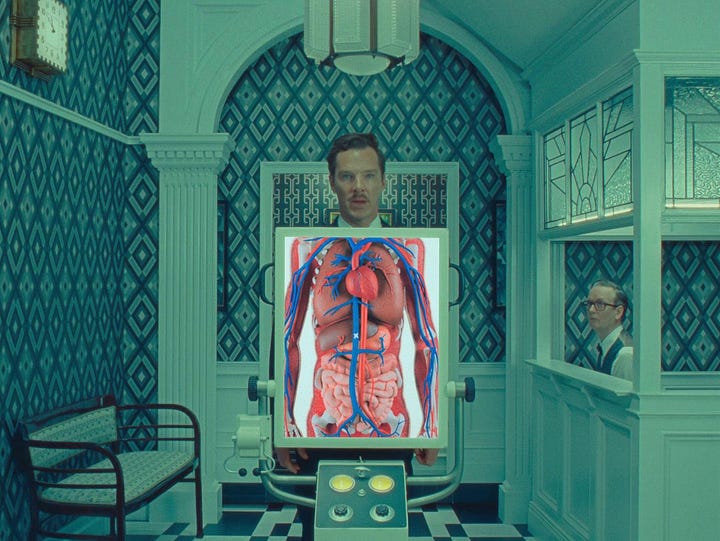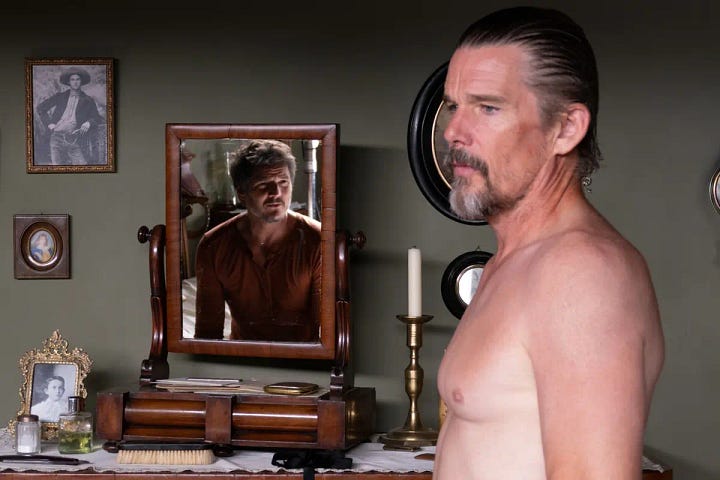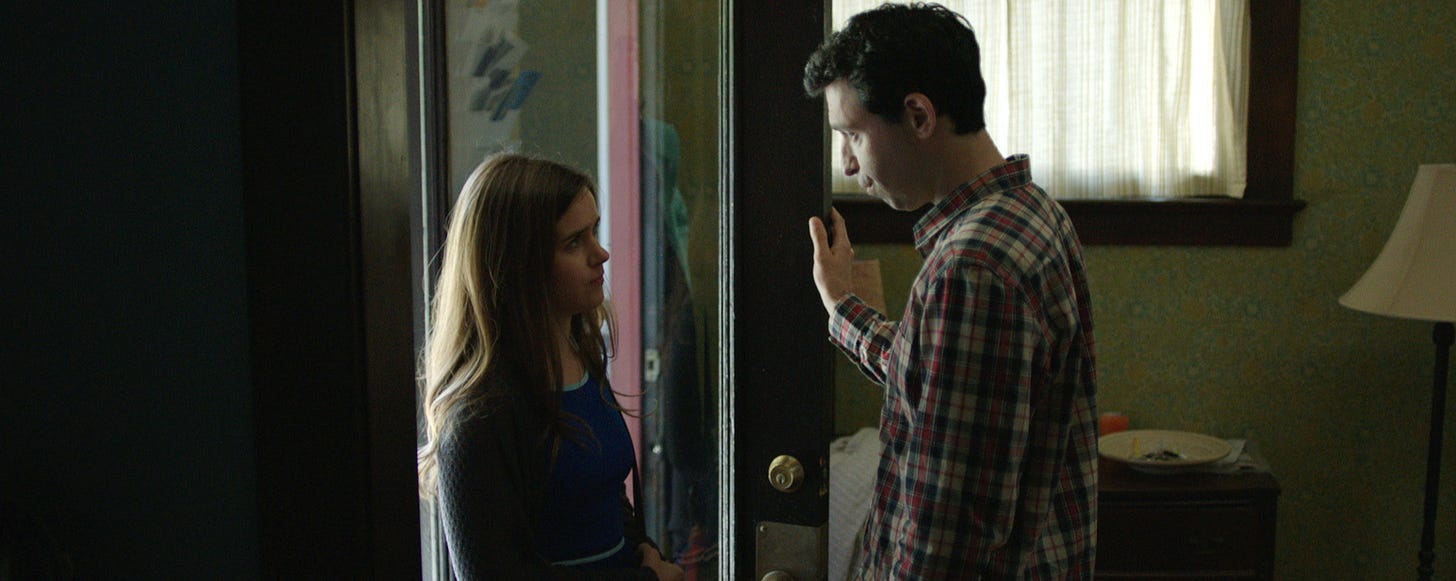Ah, short films — or as some of you might think of them, those damn categories that break your Oscar ballot every year!
Nomination voting is currently open for the Academy Awards, and the shorts categories are … unusually stacked! The Live Action Short Film category could feature work by Wes Anderson (who, ahem, has still yet to win an Oscar) and Pedro Almodóvar. Their respective 2023 The Wonderful Life of Henry Sugar and Strange Way of Life are their authors in microcosm, yes, but these smaller-scale works allowed them to play around with storytelling conventions, genre, language, and more.


Of course, that’s usually not the caliber of filmmaker who usually shows up in the category … or makes shorts altogether. The format is often dismissed as a stepping stone for feature filmmaking. Some do see it as such, yet many talented artists prove year after year that a well-executed short film has its particular pleasures that often have little to do with what makes a longer movie work.
I should fess up myself: I’m guilty, too, of primarily consuming shorts only when I know someone has later made a feature. Sure, I’ll watch the occasional one-off that’s making the rounds on social media or being feted on Letterboxd. Ever so rarely, I’ll manage to squeeze in a short film program at a festival. But none of this strikes me as an ideal way to savor the shorts for what they are — a display of passion, tenacity, and vision worthy of being viewed in isolation just like any other film.
Who better to help me understand this broken ecosystem for shorts than the very people who make them? I polled some friends of mine who have directed short films to ask them about how we might better appreciate their craft. This panel includes (in alphabetical order):
Demetrios Cokinos, director of Lightning’s Echo, a seven-minute magical realist short available to watch online
Jonah Koslofsky, director of After Party, which recently finished and is beginning its festival run in 2024
Rebecca Shoptaw, director of a new series of evocative shorts (shot on actual film stock!) entitled New Wave that will begin releasing on January 15
Mike Woodall, Jr., director of Dreaming of You, a dance-forward short film that continues its festival run in 2024
What do you wish people understood more about short films when they are watching them?
“So many YouTube videos and TikToks do technically qualify as short films, and many are deserving of that title! However, there's a real pressure to consider everything content, which I bristle at.” — JK
“I think a good short film is a lot like a poem, in that it both gives the viewer a glimpse of a scene/image and often has some kind of clever formal or structural conceit.” — RS
“Many short films are produced on extremely low budgets, often funded by the filmmakers themselves, which can lead to creative constraints around the size of the cast, number of locations, post-production capabilities and the length of the film.” — MWJ
“It’s not as hard as a feature, but it’s pretty damn hard. You’re still dealing with all the same problems, on a smaller budget and with less time, more favors (that you’ve begged for), and lots of ways the film cannot be made.” — DC
“Because screening and distribution for short films is so difficult, they usually get smushed all together into a festival program or an anthology film, and this is often not the best way to experience a short film — most of the time, you don't have enough time to finish processing one short before the next begins, and they'll often blur together when you try to remember them.” — RS
“Recognizing these limitations can help the viewers appreciate the creative thinking required to complete a succinct narrative in a shorter format. These limitations can also present an opportunity for artistic expression and cinematic experimentation.” — MWJ
“With film in general, especially short films, that every element in the frame is intentionally there, even if there was a mistake on set.” — DC
“When watching short films, one should approach with an open mind and appreciate these decisions employed by filmmakers.” — MWJ
“To give one short film one's full attention for 5 or 10 or 15 minutes and then stop watching anything for a while and just let yourself think about it in the background, as you would for a feature, is probably the best way to take in everything that's going on in a short.” — RS
What do you think a good short film does that a feature film can't?
“A good short can leave the viewer asking questions and grappling with the text the same way a feature can, but in a fraction of the time.” — JK
“Short films allow an artist to explore the narrative space a little differently, and therefore allow for more juicy surprises. Short films don’t necessarily have to follow the same story beats that a feature would.” — DC
“There are all kinds of techniques that would be surprising and perhaps read as difficult or very experimental in a feature that are incredibly common in shorts: not having dialogue, not naming the characters, having an unconventional story structure, using a single shot, ending strangely and abruptly, etc.” — RS
“Concise storytelling is a must. The dialogue and visual choices must be meaningful and move the overall story forward each time.” — MWJ
“There's also room for shorts to push a viewer into more experimental territory and consider each individual image in a way that can be overwhelming if attempted in a longer form.” — JK
“Good short films leverage experimentation [with] different cinematic techniques to maximize efficiencies on more limited budgets and timelines than feature films. This encourages innovation in short films.” — MWJ
“They aren’t beholden to the expectations that general audiences have come to find with feature films.” — DC
“A short film can really be a sort of cinematic playground, where filmmakers can try out editing techniques, story structures and cinematography styles and, with far fewer risks than in a feature film, basically just explore what a film can be.” — RS
What can the average cinephile do to better support an ecosystem to watch and appreciate short films?
“If shorts are going to exist as something other than content, we have to build that lane, collectively.” — JK
“I would recommend starting by finding a filmmaker or two you already like and watching some short films of theirs online one at a time (I'd personally recommend the shorts by Alain Resnais).” — RS
“Actively seeking out and watching short films is great, especially in the film festival circuit.” — DC
“After the screenings, most filmmakers can be found attending other events throughout the festival. Introduce yourself, follow up with additional questions, and consider following the film and filmmaker’s social media accounts.” — MWJ
“The more short films you watch, the easier it gets, as each one tends to lead you to another until it's no longer so mysterious where/how to find good short film.” — RS
“Sites like Shortverse or Vimeo or other outlets that are constantly pushing out short films.” — DC
“Explore and support different online platforms such as Short of the Week, Omeleto, NoBudge and Film Shortage.” — MWJ
“I do wish there were a better ecosystem in place than the smattering of films available on streaming services and YouTube and Vimeo, but I think now is actually one of the best times to get into watching shorts because so many of them are so readily available online.” — RS
“All mediums have their ill-conceived or poorly executed entries, but those shouldn't define short films, just as bad movies don't define movies!” — JK
“At the core of a short film is a filmmaker or a team who is trying to get noticed. If you love them, reach out to the team of filmmakers and tell them!” — DC
If this leaves you immediately craving the consumption of shorts, here are ten that I think deserve your time!
AVAILABLE ON STREAMING SERVICES
Ears, Nose and Throat, 10 minutes, Criterion Channel
When I wrote a feature about short films in 2020, some programmers bandied around the Kevin Jerome Everson as if he were a household name like Steven Spielberg. So I finally decided to see what all the fuss was about in Ears, Nose and Throat. Everson is going to make you work a bit to connect what might seem like disparate strands: a Black woman undergoing a simple medical test and the recounting of a violent incident she once witnessed. By mixing up the sensory experiences of each, he’s challenging the viewers to make a judgment call on which we value and prioritize most.
Jill, Uncredited, 18 minutes, MUBI
What a great example of how a film can teach you how to watch it. Jill, Uncredited provides an unexpected portrait of a career extra in film, at first by slowing down footage to zoom in on her appearance before “clicking” over into the subsequent appearance. What could devolve into a gimmicky “Where’s Waldo?” game ultimately becomes a beautiful statement on all that’s packed into a cinematic frame — and what artistry we can’t perceive unless we’re forced to consider it.
Point and Line to Plane, 19 minutes, Criterion Channel
There’s a whole mythology around the character in the short Point and Line to Plane being an alter ego for the director, but you don’t need that background to ruminate in the sublime sensations of this work. It’s a rumination on the loss of a loved one and how we try to locate fragments of them in what they loved on earth. That kind of emotionalism could turn maudlin, or perhaps downright depressing in feature form. At just under 20 minutes, it’s perfectly pitched here.
Still Processing, 17 minutes, Criterion Channel
Diaristic films run an enhanced risk of becoming solipsistic, but the sensitive Sophy Romvari deftly dodges all landmines as she excavates her family history in front of the camera. There’s a tactile quality to Still Processing as Romvari handles physical forms of old film and undeveloped photograph negatives containing family members no longer alive. It’s a work of exquisite vulnerability that cheats out to the audience, allowing us to recognize ourselves in her own story … and perhaps even shoulder some of the burden.
The Unauthorized Bash Brothers Experience, 30 minutes, Netflix
Look, no one said these all had to be rigorously austere aesthetic exercises! The Lonely Island crew had a concept for The Unauthorized Bash Brothers Experience about Mark McGwire and Jose Canseco that merited more than a single digital short but could not sustain a full feature like Popstar. This half-hour delight is a kooky visual concept album that only this trio could produce. I was hooked from the opening frame that spoofed the Sony Pictures Classics logo and still randomly get many of the catchy tunes stuck in my head.
AVAILABLE FOR FREE
Life’s a Bitch, 6 minutes
Warning: you may lose all tolerance for contrived scenes in rom-coms after watching Life’s a Bitch. French director François Jaros provides all the major genre beats in miniature here. You’ll be shocked at how satisfied you’ll be, almost as if you managed to consumer a full nutritious meal from just a single bite.
Possibilia, 6 minutes
The three-time Oscar-winning directing duo Daniels were thinking about multiversal storytelling long before Everything Everywhere All at Once. Their early short film Possibilia plays out any number of different paths a single fight between a couple could take … and allows you to toggle between the variations at will in a specially designed interface. Perhaps this is as much a video game as cinema? It’s worth experiencing for yourself and seeing how the filmmakers were interested in pushing the form from the get-go.
(NOTE: Click the photo below to be taken to the interactive short.)
Speaking Is Difficult, 12 minutes
How do you possibly convey the sheer magnitude and human toll of America’s problem with gun violence? AJ Schnack finds a way to make the numbing headlines hit with guttural impact in Speaking Is Difficult, a documentary short regrounding a national shame in searingly human terms. Rather than describing his central conceit with words, I’ll let the film knock you off your feet instead.
1009, 13 minutes
A proof-of-concept short film does not have to be tedious! While these means to an end usually tend to be single scenes that will eventually end up in a feature film, sometimes they can be beautiful works unto themselves. Case in point: Josh Mond’s 1009, the short he made to prep for his knockout 2015 feature James White. This manages to capture the general vibe that he harnesses for the fully-fleshed out story, one of intense and heightened subjectivity with leading man Christopher Abbott. 1009 merits a watch not simply as an origin story for its feature but also as a complimentary companion piece to it.
Verbatim: What Is a Photocopier?, 7 minutes
I’ll end with a short that is, admittedly, somewhat less outwardly ambitious than some of the other works I’ve recommended. Verbatim: What Is a Photocopier? consists of a dramatic recreation of a particularly absurd courtroom transcript. It’s directed and acted with a keen sense of the ratcheting comedy within the scene. The whole thing gets in, does what it wants to do, and doesn’t overstay its welcome. But sometimes, all a filmmaker needs is a strong hook and tight execution to pull off a creative concept with panache and power.
First piece of 2024! I interviewed writer/director Felipe Gálvez for Slant Magazine about his new film The Settlers, opening today at IFC Center in NYC (and will eventually be available to stream on MUBI). This slice of history from Chile’s settling as seen through the prism of a Western absolutely rips.
AN UPDATE FOR 2024
I’ll be gating the What I Watched, What I Heard, and What I Read for paying subscribers only! If you want the full digest, I request that you consider upgrading for the experience. It takes time, effort, and passion to put this newsletter together for you. I hope you find it worth paying to receive. (Don’t forget, there are also many other subscriber perks!)
Keep reading with a 7-day free trial
Subscribe to Marshall and the Movies to keep reading this post and get 7 days of free access to the full post archives.










